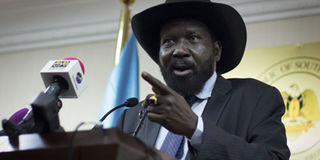S.Sudan boosts presidential powers

South Sudan president Salva Kiir
South Sudan's parliament changed the constitution Thursday to boost presidential powers amid fears violence is spreading to new areas in the country, with seven killed on the highway to Uganda.
The constitutional change comes after President Salva Kiir ordered the number of regional states to be nearly tripled, undermining a fundamental pillar of a power-sharing deal to end a nearly two-year long civil war.
"This amendment is actually paving the way for the introduction of the new states," Information Minister Michael Makuei said.
The creation of new states threatens to undermine a complex power-sharing formula, the basis of the peace deal, to forge a transitional government.
But lawmakers also voted in support of the August peace deal, despite both army and rebels repeatedly accusing each other of breaking the eighth such agreement.
The civil war began in December 2013 when President Salva Kiir accused his former deputy Riek Machar of planning a coup, setting off a cycle of retaliatory killings that have split the poverty-stricken, landlocked country along ethnic lines.
On Thursday morning, unknown gunmen ambushed a bus and four lorries travelling on the main highway to Uganda some 130 kilometres (80 miles) south of Juba, on the main trade route for South Sudan.
"A bus carrying passengers and four lorries were attacked... three passengers and four drivers were killed," said Eastern Equatoria state information minister Mark Akio.
The worst of the fighting has been concentrated in three states -- Unity and Upper Nile in the north, and Jonglei in the east, often pitting rival Dinka and Nuer ethnic groups against each other.
In recent months however attacks have escalated in the far south, although it remains unclear who is behind the violence there.
The conflict has triggered a humanitarian crisis with 2.3 million people forced from their homes and 4.6 million in need of emergency food. Tens of thousands have died and the economy has all but collapsed.
Despite the constitutional changes, the government has said it expects the first rebel delegation to soon arrive in Juba, a key step in making the peace deal a reality on the ground.



